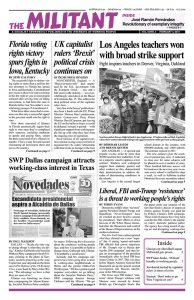MANCHESTER, England — A “Brexit-in-name-only” deal negotiated by the U.K. government with the European Union — two and a half years in the making — was overwhelmingly voted down in the House of Commons Jan. 15. This reflects the deep political crisis of the capitalist rulers here.
Very few in the bosses’ political parties favor a break with the EU. Prime Minister Theresa May’s predecessor, former Conservative Party Prime Minister David Cameron, put leaving the EU on the ballot in hopes it would be defeated. Instead, it passed — with significant support from working people fed up with what they face from the ongoing crisis of capitalism.
Rival factions of all capitalist parties continue to slug it out over how to negotiate the U.K. rulers’ relationship with their rivals in Europe in the face of the precipitous decline of British capitalism on the world stage. Prime Minister May wants an ongoing form of EU affiliation even after the March 29 date for the U.K. leaving the EU comes due; others maneuver across party lines seeking the votes to stay in the single market, or to cancel the referendum’s outcome altogether.
They shudder at the idea of a sharp break with their rivals, also their allies, on the Continent. A definitive break would put workers in the U.K. in a better position to fight for their own interests against their main enemy — the capitalist rulers at home.
There is growing pressure among propertied rulers and their mouthpieces in Parliament for a delay as the deadline for Brexit — deal or no deal — looms ever closer. Labour Party Members of Parliament, as well as within May’s government itself, are seeking cross-party support for a bill to require the government to seek a nine-month extension, while EU officials are reportedly drawing up proposals for Britain to maintain “pay-as-you-go” membership while talks go on and on.
The day after the government’s defeat, Labour Party leader Jeremy Corbyn moved a motion of “no confidence” in the government, which also was defeated. Then Corbyn refused May’s invitation for cross-party talks unless, he said, she rules out “the threat of a disastrous ‘no deal’ outcome.”
In a letter to the prime minister, he reiterated the call for “a new comprehensive UK-EU customs union; a strong Single Market deal; and guarantees that there can be no race to the bottom on rights and standards.” Corbyn, like many liberals and middle-class radicals, puts forward the false notion that workers’ rights can be protected by EU regulations, rather than through working-class struggles.
Corbyn faces his own leadership challenges. Some leading Labour MPs broke ranks and met with May. Others press for the party to push for a new referendum. Tens of thousands of party members have walked out in recent months.
Workers cheer for end to stalling
Speaking on the BBC’s political talk show “Question Time” Jan. 17, journalist Isabel Oakeshott argued that Theresa May should just walk away from the EU. Asked if she really meant the U.K. should walk away, deal or no, she said yes. There was an instant, loud cheer from the audience.
“This cheer — from an audience in the largely working-class, Labour-leaning city of Derby,” Brendan O’Neill wrote in the Spectator, “was a stark reminder that there are people out there, a great many people, who do not share the political class’s fear of No Deal.”
“It was a statement — a noisy, rebellious statement of the people’s continuing and profound attachment to the idea of leaving the European Union, deal or no deal,” he said.
As Communist League members discuss a road forward with fellow workers in the face of the protracted economic and social crisis, they explain why EU membership in any form is a blow to workers’ interests. “They’re all talking about a deal, but what people voted for was to leave,” CL member Pete Clifford told care worker Rebecca Murphy on her doorstep in Wythenshawe, south Manchester.
Murphy said the politicians’ Brexit “debate” was hard to follow. “I voted remain, but I think we’ll be fine either way,” she said.
“With the U.K. out of the EU,” Clifford responded, “the real fight will be much clearer — which class controls the country.”
“Right now, it’s the rich,” said Murphy.
“Yes, and they’re the real enemy we have to take on,” Clifford said. “Workers need to take political power here in the U.K.”
Like many workers, Murphy said she was following the yellow vest actions by working people in France. Clifford responded, “They need our solidarity.”
Inspiration from yellow vest protests
For the 10th week in a row, tens of thousands of French workers, farmers and small proprietors turned out for protests across France Jan. 19.
Eric Drouet, a lorry driver from Melun, east of Paris, one of the initiators and leaders of the yellow vest movement, was at the Paris protest. Drouet had been arrested Jan. 2 in a crackdown on protesters by the government of French President Emmanuel Macron. The yellow vests call Macron the “president for the rich.”
“There’s never been anything like this movement,” Drouet told the Militant. “This is going to be hard, and we’re not about to win in a single day. But this is a movement that’s going to grow.”
That chills the rulers in France and across Europe, including in the U.K. In these protests, and in the workers in the U.K. who call for the British rulers to “get out” of the EU, they see the continued coming apart of the misnamed European “Union.” This bloc — formed in the name of greater protection in competition with the dominant U.S. bosses — is a tool to enrich the rulers in Germany, and to a lesser degree Paris. They use it to suck profit out of their rivals in Greece, Spain, Italy and the other weaker capitalist “partners.”
The ones who pay the highest price as a result of the rulers’ conflicts are working people everywhere.

